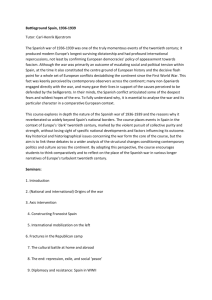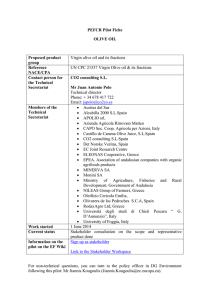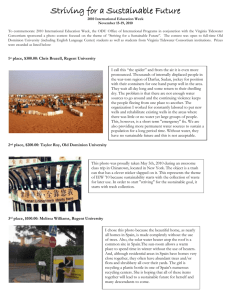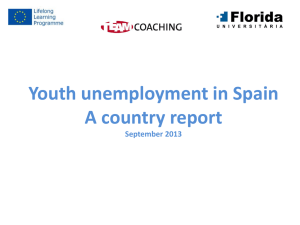Monitoring template
advertisement
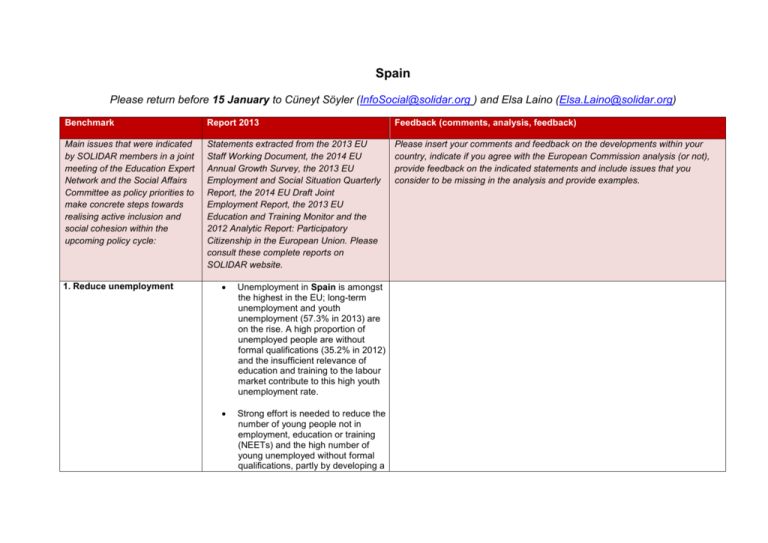
Spain Please return before 15 January to Cüneyt Söyler (InfoSocial@solidar.org ) and Elsa Laino (Elsa.Laino@solidar.org) Benchmark Report 2013 Feedback (comments, analysis, feedback) Main issues that were indicated by SOLIDAR members in a joint meeting of the Education Expert Network and the Social Affairs Committee as policy priorities to make concrete steps towards realising active inclusion and social cohesion within the upcoming policy cycle: Statements extracted from the 2013 EU Staff Working Document, the 2014 EU Annual Growth Survey, the 2013 EU Employment and Social Situation Quarterly Report, the 2014 EU Draft Joint Employment Report, the 2013 EU Education and Training Monitor and the 2012 Analytic Report: Participatory Citizenship in the European Union. Please consult these complete reports on SOLIDAR website. Please insert your comments and feedback on the developments within your country, indicate if you agree with the European Commission analysis (or not), provide feedback on the indicated statements and include issues that you consider to be missing in the analysis and provide examples. 1. Reduce unemployment Unemployment in Spain is amongst the highest in the EU; long-term unemployment and youth unemployment (57.3% in 2013) are on the rise. A high proportion of unemployed people are without formal qualifications (35.2% in 2012) and the insufficient relevance of education and training to the labour market contribute to this high youth unemployment rate. Strong effort is needed to reduce the number of young people not in employment, education or training (NEETs) and the high number of young unemployed without formal qualifications, partly by developing a 2. Improve access to and quality of healthcare and social services system of early career counselling (cooperation between schools and PES), job-search assistance for the young unemployed and early school leavers and improved systems for the validation of competences acquired at work to facilitate re-entry to education and training and targeted re-skilling. In-work poverty rates remained at 12.3 % in 2011, above the EU average, reflecting the deterioration of the situation for some clusters of the employed population (notably young people, the low skilled and temporary workers). Poor language skills constitute an important obstacle to studying and working mobility, with negative implications for youth employment. The employability and working conditions of older workers, partially addressed with the measures on early and part-retirement introduced in March 2013, also deserve attention to support the planned increase in the statutory and the effective retirement age. According to the latest long-term projections, public healthcare spending in Spain will increase by 1.3 percentage points of GDP by 2060. Crisis-related expenditure cuts have helped contain the growth in spending. Public healthcare expenditure decreased from 7.1% of GDP in 2010 to 6.7% in 2011. In 3. Promote access and participation in lifelong learning 4. Strengthen active citizenship and volunteering for social cohesion 2010 and 2011 savings originated from cuts in the wage bill and pharmaceutical expenditure. In 2012, measures specifying the common basket of healthcare benefits and an extension of copayments on pharmaceutical products were adopted. The National Competition Authority refers to numerous competition problems at regional level (especially restrictive regulation) and local level (protection of incumbents in the area of public services). In Spain there is a need to reinforce the contribution of the education and training system at all levels to human capital formation. Major challenges in the education system are the transition from education and training to the labour market, a persistently high rate of early leavers from education and training (24.9% in 2012) and insufficient tailoring of skills and capabilities to market needs. Some 29% of 25-29 year-olds in Spain are not in employment, education or training, and vocational training remains insufficiently used. In Spain Participatory Citizenship is about 'an individual's fundamental right to participate and exercise influence on the development of society'. It incorporates a political dimension (democracy, duties, freedom, respect and participation), a cultural dimension (identity, diversity, multiculturalism, interculturalism) and a social dimension (equality, cohesion, pluralism). Political civil society activities: 5. Fight discrimination and social exclusion Of those European countries that provided an assessment of the degree of policy emphasis of this dimension: 11 countries assessed it as having some policy emphasis including Spain. There has been relatively little change in voting in national elections in Spain. Almost all EU countries have low rates of adult volunteering for trade unions and there was a complex mix of countries across the range. There was less than 1% engagement in Spain. France achieves the highest rates with almost 45 per cent of the population having been engaged in legal protests and Denmark and Spain are also above the 30 per cent level. Spain has moved further away from its target of reducing the number of people at risk of poverty and/or social exclusion. On the contrary, the latter rose by 0.7 million in 2011 alone, on top of the 1.1 million increase in 2010. Meanwhile, the social protection system has been intensely challenged by the recession. Poverty and social exclusion keep increasing, mainly as a result of the labour market situation, high household debt levels and the limited effectiveness of the social protection system to respond to growing needs. No progress has been made towards meeting the target of reducing the number of people at risk of poverty and social exclusion by 1.4-1.5 million by 2020. Severe material deprivation affected 3.9 % of the total population in 2011, while the at-risk-of-poverty rate rose to 21.8 % and the at risk of poverty and social exclusion to 27 %. The share of people living in households with very low work intensity rose to 12.2 % in 2011. Children are at particular risk of poverty, showing the highest rate among all age groups, especially in low work intensity households. 6. Promote the social economy General remarks and other comments Please add feedback on issues not indicated in the above mentioned bench marks Contact details: Organisation: Please indicate the name of your organisation Name: Please include your name; SOLIDAR will not publish personal data Date, Place: Please include the date and place of filling out this form Mail: Please include your e-mail; SOLIDAR will not publish personal data Telephone: Please include your telephone number; SOLIDAR will not publish personal data





